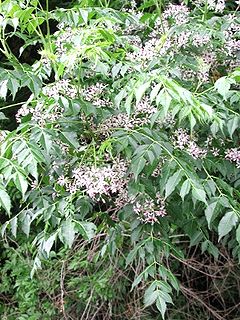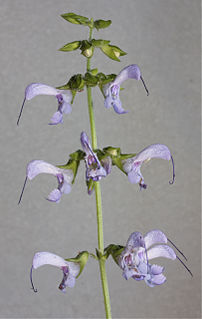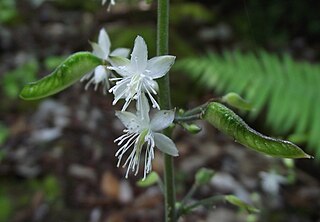
Meliaceae, the mahogany family, is a flowering plant family of mostly trees and shrubs in the order Sapindales.

Incubation period is the time elapsed between exposure to a pathogenic organism, a chemical, or radiation, and when symptoms and signs are first apparent. In a typical infectious disease, the incubation period signifies the period taken by the multiplying organism to reach a threshold necessary to produce symptoms in the host.

Severe acute respiratory syndrome coronavirus 1 is a strain of coronavirus that causes severe acute respiratory syndrome (SARS), the respiratory illness responsible for the 2002–2004 SARS outbreak. It is an enveloped, positive-sense, single-stranded RNA virus which infects the epithelial cells within the lungs. The virus enters the host cell by binding to angiotensin-converting enzyme 2. It infects humans, bats, and palm civets.

Salvia miltiorrhiza, also known as red sage, Chinese sage, tan shen, or danshen, is a perennial plant in the genus Salvia, highly valued for its roots in traditional Chinese medicine. Native to China and Japan, it grows at 90 to 1,200 m elevation, preferring grassy places in forests, hillsides, and along stream banks. The specific epithet miltiorrhiza means "red ochre root".

Beesia is a genus of flowering plants in the buttercup family. It was named in 1915 after the plant nursery firm Bees of Chester, who financed the plant hunting trips of George Forrest and Frank Kingdon-Ward in China.

An artificial enzyme is a synthetic organic molecule or ion that recreates one or more functions of an enzyme. It seeks to deliver catalysis at rates and selectivity observed in naturally occurring enzymes.

Triplophysa is a genus of fish in the family Nemacheilidae found mainly in and around the Qinghai-Tibet Plateau in China. Currently, the genus is a mixed assemblage of species. Some lineages have been identified and treated as subgenera, but as Wikipedia follows Fishbase for fish species all but Hedinichthys have been treated as subgenera in Wikipedia, although Kottelat in his revision of the loaches did recognise them as valid. FishBase, however, includes these in Triplophysa without specifying subgenera and treats the names given by Kottelat as synonyms.

The China women's national volleyball team represents the People's Republic of China in international volleyball competitions and friendly matches governed by Chinese Volleyball Association. They are one of the leading and most successful squads in women's international volleyball, having won ten championships titles in the three major international competitions of volleyball, including five World Cups, two World Championships and three Olympic titles. The current head coach is Cai Bin.

The basal angiosperms are the flowering plants which diverged from the lineage leading to most flowering plants. In particular, the most basal angiosperms were called the ANITA grade which is made up of Amborella, Nymphaeales and Austrobaileyales.

Huáng bǎi, huáng bó or huáng bò is one of the fifty fundamental herbs of traditional Chinese medicine. Known also as Cortex Phellodendri, it is the bark of one of two species of Phellodendron tree: Phellodendron amurense or Phellodendron chinense.

The Han Triumph, also known as Wind Ode, is a Chinese television series based on historical events in the early Han dynasty, beginning with the founding of the dynasty by Liu Bang after his triumph over Xiang Yu, and the events leading to the reign of Liu Heng. Directed by Huang Jianzhong, the series starred Ray Lui, Wang Ji, Liu Mu, Zhang Guangbei, Chen Wei and Li Qingxiang in the leading roles. It was first broadcast on CCTV-8 in China on 17 December 2011.

Thinopyrum ponticum is a species of grass known by the common names tall wheatgrass, rush wheatgrass, and Eurasian quackgrass. It is native to Eurasia and it has been introduced to many other parts of the world, including much of the Americas and Australia.

Heroes in Sui and Tang Dynasties is a Chinese television series based on Chu Renhuo's historical novel Sui Tang Yanyi, which romanticises the historical events leading to the fall of the Sui dynasty and the rise of the Tang dynasty. The series was first broadcast in mainland China on various television networks on 14 January 2013. It is not to be confused with Heroes of Sui and Tang Dynasties 1 & 2, a similar television series also based on the novel, but was released earlier in December 2012. Filming for the series started on 5 November 2011 at the Hengdian World Studios and wrapped up in May 2012.

Pseudoginsenoside F11 is a chemical natural product found in American ginseng but not in Asian ginseng, although it has similar properties to the Asian ginseng compound ginsenoside Rf. The molecule is a triterpenoid saponin member of the dammarane family and contains a four-ring rigid skeleton. Compounds in the ginsenoside family are found almost exclusively in plants of the genus Panax. A wide variety of difficult-to-characterize in vitro effects have been reported for the compounds in isolation. Pseudoginsenoside F11 and its derivatives are sometimes referred to as having an ocotillol-type skeleton structure.

Li Jiayang is a Chinese agronomist and geneticist. He is Vice Minister of Agriculture in China and President of the Chinese Academy of Agricultural Sciences (CAAS). He is also Professor and Principal investigator at the Institute of Genetics and Development at the Chinese Academy of Sciences (CAS).
Rheum lhasaense is a plant from eastern Tibet belonging to the genus Rheum in family Polygonaceae. It is a mid-sized rhubarb species with triangular leaves and spherical fruit.
This article records new taxa of plants that are scheduled to be described during the year 2018, as well as other significant discoveries and events related to paleobotany that occurred in the year 2018.
This article records new taxa of plants that were described during the year 2014, as well as other significant discoveries and events related to paleobotany that occurred in the year 2014.
This article records new taxa of fossil plants that are scheduled to be described during the year 2020, as well as other significant discoveries and events related to paleobotany that are scheduled to occur in the year 2020.
The Sound of Happiness is a Taiwanese Hokkien television drama that began airing on SET Taiwan in Taiwan on 26 December 2018, from Mondays to Fridays, and ended its broadcast on 5 August 2020. The series started production on 22 November 2018. The series is aired every weeknight at 8pm and is simulcast one hour later on SET Taiwan's sister channel, SET Drama.

















